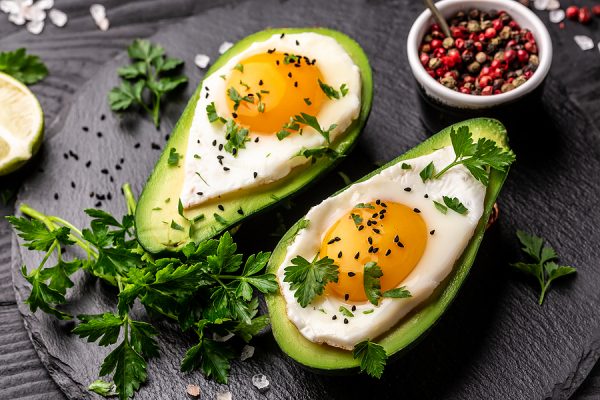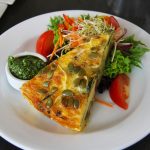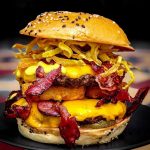Do you run out of steam before the day ends, or maybe even before it starts?
If there isn’t an underlying health condition involved, there are a lot of different reasons this could happen. You might not be sleeping as well as you should. Maybe you’re not getting enough exercise. Stress can do it to you. So can dehydration.
But sometimes it’s the foods you’re eating. Or not eating.
Maybe you’re eating foods that spike your blood sugar. You could be eating foods that are not as nutritious as you think they are. Or maybe you’re flat out not eating enough.
That’s why I always like to add some energy boosting foods to my snacks and meals.
Some of my favorite energy foods are blueberries, nuts and avocado.
In the evening, I like to combine a cup of organic blueberries with plant-based yogurt. Then I mix in two tablespoons of chia seeds, a few drops of vanilla, and let it sit overnight. The next day, you’ll have a delicious and healthy chia seed pudding.
My mouth is watering right now just thinking about it!
The thing about this morning treat is that it increases my mental energy and gets my day started on the right track. I’ll have hours of increased concentration and focus.
And nuts… they are high in protein and phytosterols. So they provide plenty of energy for your body, they’re anti-inflammatory, and also help with your blood sugar.
Another one of my favorites is avocado. I eat them whole, slice them into salads, use them for guacamole and frequently add them as a garnish to eggs and other foods. I’ve also had avocado brownies with walnuts which were tastier and richer than regular brownies.
Eating just half of an avocado with your lunch can improve insulin response and lower your blood sugar. So it can help prevent those afternoon sugar slumps. Plus, they keep you full longer than eating a meal without avocado.
These are just three terrific energy foods, but there are a lot more available to you.
More Foods for Greater Energy and Focus
Eggs are another excellent source of energy. And the choline in the yellow is good for your brain. It’s needed to produce acetylcholine in your brain. This neurotransmitter affects mood, brain function, memory and motor control.
It’s a myth that eggs are bad for you. But it’s a good idea to keep your eggs intact (not breaking the yellows) to keep the cholesterol in the eggs from oxidizing. They are much healthier if you prepare them over easy, over well, poached or boiled.
Pastured eggs are the kind that I buy. They are, by far, the healthiest eggs you’ll find today. When you find one where the yolk is orange, stick with that farm.
Pulses like lentils and beans are great. The carbs in them are digested slowly, which helps keep your blood sugar stable. They are high in fiber and protein, so you get steady energy throughout the day. You can add them to soups or find them in hummus, bean salads, succotash and other dishes. (These are not the carbs you should be avoiding…the offenders are the refined carbs; white flour, rice and sugar.)
And let’s not forget about seafood. The omega 3 fatty acids in fish help to enhance physical performance, stamina and recovery in athletes, and improve blood flow to the brain during mental activity. They supercharge both your body and your brain.
Your body can’t make omega 3 fatty acids on its own. You have to get them from the foods you eat. Salmon, sardines, mackerel, herring and anchovies are some of the highest sources of omega 3s. If you don’t like fish, you can always supplement with a high-quality fish oil formula.
Beverages that Energize You
Coffee and tea are both fantastic energizers. Coffee has slightly more caffeine in it than tea, so it will give you a quicker boost. The boost from tea will be more gradual and is less likely to make you jittery or jumpy. That’s because tea contains a wonderful amino acid called L-theanine, which helps you stay relaxed while remaining alert.
But I would stay away from canned or bottled energy drinks if I were you. They have extremely high amounts of caffeine and sugar that can lead to headaches, nervousness, heart problems and even seizures.
Surprisingly, water alone can keep you from feeling fatigued during the day. If you’re not getting enough of it, you could be dehydrated, a known cause of low energy. Without enough water, your body can’t carry nutrients to the cells. Nor can it take away waste products. Not enough cellular water will grind your metabolic processes down to barely functioning… So, of course you’ll feel sluggish.
Along with these energy tips, eat a balanced diet; complete with organic fruits, vegetables, healthy fats, wild caught fish and grass-fed or pastured proteins. Avoid processed foods high in sugar, fat and artificial ingredients.
Remember, a no label food is what we’re made to eat and they come in their own natural containers.
SOURCES:
Salehi-Sahlabadi, A., Varkaneh, H.K., Shahdadian, F. et al. Effects of Phytosterols supplementation on blood glucose, glycosylated hemoglobin (HbA1c) and insulin levels in humans: a systematic review and meta-analysis of randomized controlled trials. J Diabetes Metab Disord 19, 625–632 (2020).
Mazidi M, Vatanparast H, Katsiki N, Banach M. The impact of nuts consumption on glucose/insulin homeostasis and inflammation markers mediated by adiposity factors among American adults. Oncotarget. 2018;9(58):31173-31186.
Paniagua JA, et al. Monounsaturated fat-rich diet prevents central body fat distribution and decreases postprandial adiponectin expression induced by a carbohydrate-rich diet in insulin-resistant subjects. Diabetes Care. 2007 Jul;30(7):1717-23.
Wien M, et al. A randomized 3×3 crossover study to evaluate the effect of Hass avocado intake on post-ingestive satiety, glucose and insulin levels, and subsequent energy intake in overweight adults. Nutr J. 2013 Nov 27;12:155.
Poly C, et al. The relation of dietary choline to cognitive performance and white-matter hyperintensity in the Framingham Offspring Cohort. Am J Clin Nutr. 2011 Dec; 94(6): 1584–1591.
McCrory MA, Hamaker BR, Lovejoy JC, Eichelsdoerfer PE. Pulse consumption, satiety, and weight management. Adv Nutr. 2010;1(1):17-30.
Mudryj AN, Yu N, Aukema HM. Nutritional and health benefits of pulses. Appl Physiol Nutr Metab. 2014 Nov;39(11):1197-204.
Gammone MA, Riccioni G, Parrinello G, D’Orazio N. Omega-3 Polyunsaturated Fatty Acids: Benefits and Endpoints in Sport. Nutrients. 2018;11(1):46.
Jackson PA, Reay JL, Scholey AB, Kennedy DO. DHA-rich oil modulates the cerebral haemodynamic response to cognitive tasks in healthy young adults: a near IR spectroscopy pilot study. Br J Nutr. 2012 Apr;107(8):1093-8.
Torquati L, Peeters G, Brown WJ, Skinner TL. A Daily Cup of Tea or Coffee May Keep You Moving: Association between Tea and Coffee Consumption and Physical Activity. Int J Environ Res Public Health. 2018;15(9):1812.




